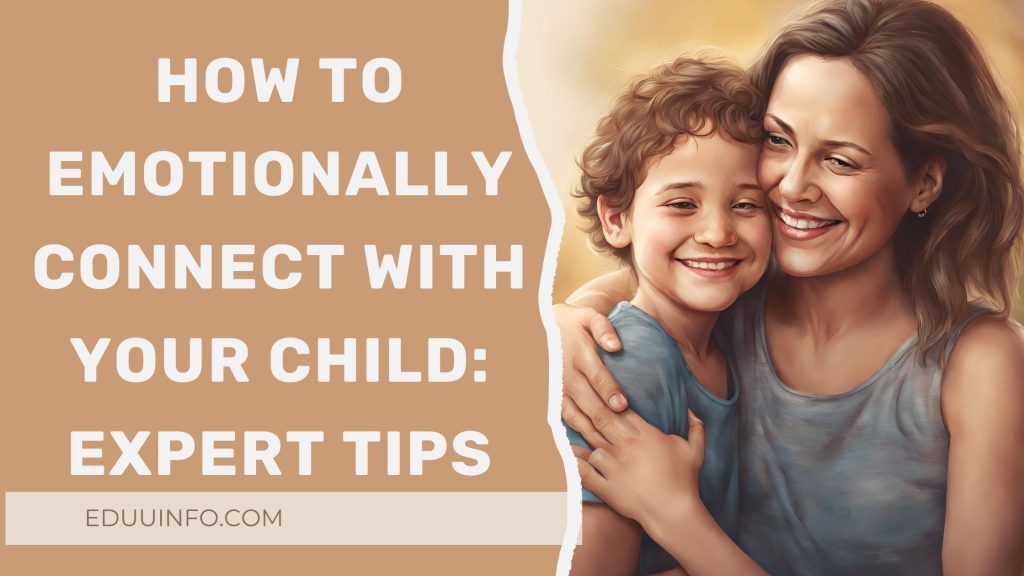Do you sometimes feel like you don’t understand what your child is feeling or how to respond to their emotions? If your answer is yes then this article on how to emotionally connect with your child is for you.
Emotional connection is important for a healthy and loving relationship between a parent and a child.
Advertisement
It helps your child develop social and emotional skills, such as self-awareness, self-regulation, communication, and problem-solving.
However, emotional connection is not something that happens automatically or easily.
It requires time, effort, and patience from both sides.
It also requires some skills and strategies that you can learn and practice.
In this article, we will share with you some tips on how to emotionally connect with your child and make your relationship more fulfilling and rewarding.
Let’s get into it.
How to Emotionally Connect with Your Child
1. Be Present and Attentive
One of the most important ways on how to connect with your child is to be present and attentive when you are with them.
This means putting away your phone, laptop, or other distractions, and focusing on your child and what they are saying or doing.
It also means being interested in their thoughts, feelings, and experiences, and asking open-ended questions to encourage them to share more.
Doing these shows your child that you care about them and that they are important to you.
With these, you can also notice their emotional signals and respond appropriately.
If your child is sad, you can offer them a hug, a kind word, or a listening ear. If your child is excited, you can celebrate with them, praise them, or join them in their activity.
Here are some tips to be present and attentive with your child:
- Set aside some quality time every day to spend with your child, doing something that they enjoy or that you can do together.
- When your child talks to you, look them in the eye, nod, smile, and use affirming words or gestures to show that you are listening and engaged.
- When your child shows you something, express genuine interest and appreciation, and ask them to tell you more about it.
- When your child does something well, acknowledge their effort and achievement, and tell them how proud you are of them.
- When your child makes a mistake, avoid criticizing or shaming them, and instead help them learn from it and move on.
2. Be Expressive and Authentic
Another way to emotionally connect with your child is to be expressive and authentic with your own emotions.
This means being able to name, accept, and communicate your feelings, and being honest and vulnerable with your child.
It also means being able to model healthy and positive ways of coping with your emotions, and being open to feedback and learning from your child.
Being expressive and authentic with your emotions shows your child that you are human and that you have feelings too.
It also helps your child to understand and empathize with your emotions, and to feel more comfortable and confident with their own emotions.
Some ways to be expressive and authentic with your emotions are:
- Use “I” statements to express your feelings, such as “I feel…”, “I need…”, or “I want…”.
- Use a wide range of emotional words to describe your feelings, such as “happy”, “sad”, “angry”, “scared”, “surprised”, “disgusted”, “proud”, “ashamed”, etc.
- Use body language, facial expressions, and tone of voice to convey your emotions, such as smiling, frowning, raising your voice, lowering your voice, etc.
- Use humor, creativity, or art to express your emotions, such as telling a joke, writing a poem, or drawing a picture.
- Use coping strategies to manage your emotions, such as breathing, meditating, exercising, talking to someone, or doing something relaxing.
- Use apologies, compliments, or gratitude to repair or enhance your relationship with your child, such as saying “I’m sorry”, “I love you”, or “Thank you”.

3. Be Supportive and Respectful
Another way how to connect with your child emotionally is to be supportive and respectful of their emotions.
This means being able to validate, acknowledge, and accept your child’s feelings, and being able to offer them comfort, guidance, and encouragement.
It also means being able to respect your child’s boundaries, preferences, and choices, and being able to negotiate and compromise with them.
Being supportive and respectful of your child’s emotions shows your child that you love them unconditionally and that you are there for them.
It also helps your child to feel safe, secure, and confident with their emotions, and to develop resilience and self-esteem.
For example, if your child is afraid, you can reassure them, comfort them, and help them face their fear.
If your child is angry, you can empathize with them, validate their feelings, and help them calm down and solve the problem.
Some ways to be supportive and respectful of your child’s emotions are:
- Use reflective listening to show that you understand and care about your child’s feelings, such as “You sound…”, “You seem…”, or “You must feel…”.
- Use empathic statements to show that you feel and share your child’s feelings, such as “I know how you feel…”, “I can see why you feel…”, or “I feel the same way…”.
- Use comforting gestures to show that you are there for your child, such as hugging, holding hands, stroking hair, or rubbing back.
- Use positive reinforcement to show that you appreciate and encourage your child’s emotions, such as “I’m glad you feel…”, “I’m proud of you for feeling…”, or “I admire you for feeling…”.
- Use problem-solving skills to show that you are willing and able to help your child with their emotions, such as “What can we do to make you feel better?”, “How can we avoid this situation in the future?”, or “What can we learn from this experience?”.
- Use respectful language to show that you value and respect your child’s emotions, such as “Please”, “Thank you”, “I’m sorry”, or “I understand”.
Wrapping Up on how to emotionally connect with your child
Emotional connection is an important aspect of a healthy and loving relationship between a parent and a child.
It can help you and your child to communicate better, understand each other better, and support each other better. It can also help your child to develop social and emotional skills that will benefit them throughout their life.
In this guide, we have shared 3 expert tips o how to emotionally connect with your child.
You can try to be present and attentive, be expressive and authentic, and be supportive and respectful of their emotions.
These tips and ideas can help you to create a stronger bond with your child and make your relationship more fulfilling and rewarding.
We hope you enjoyed reading this article and learned something new and useful about how to connect with your child emotionally
If you have any questions, comments, or feedback, please feel free to leave them below.
We would love to hear from you and learn from you.
Thank you for reading. We hope you visit http://eduuinfo.com again.
Advertisement



